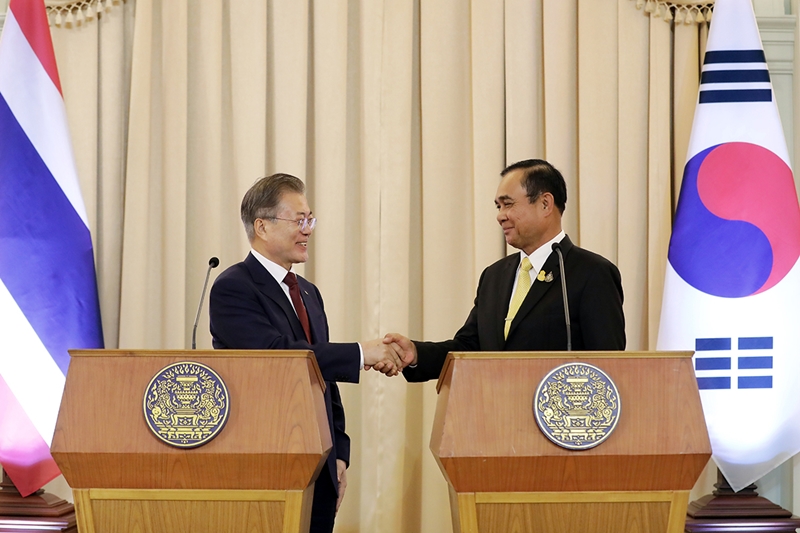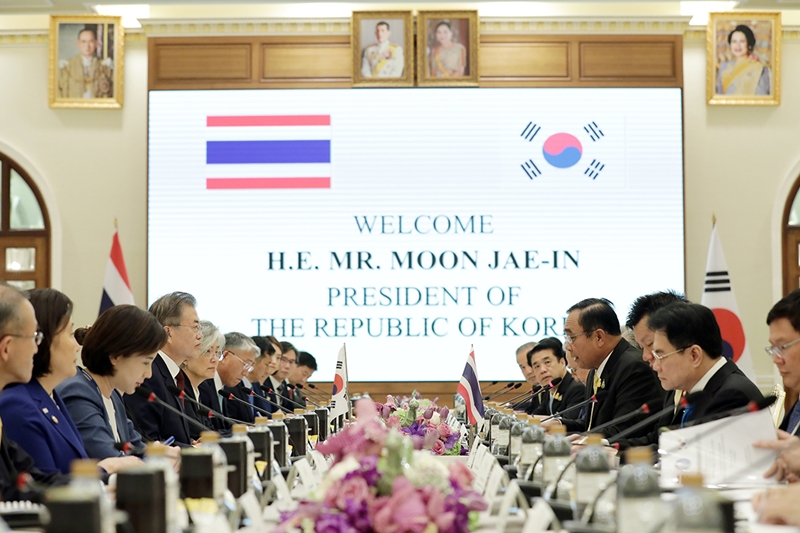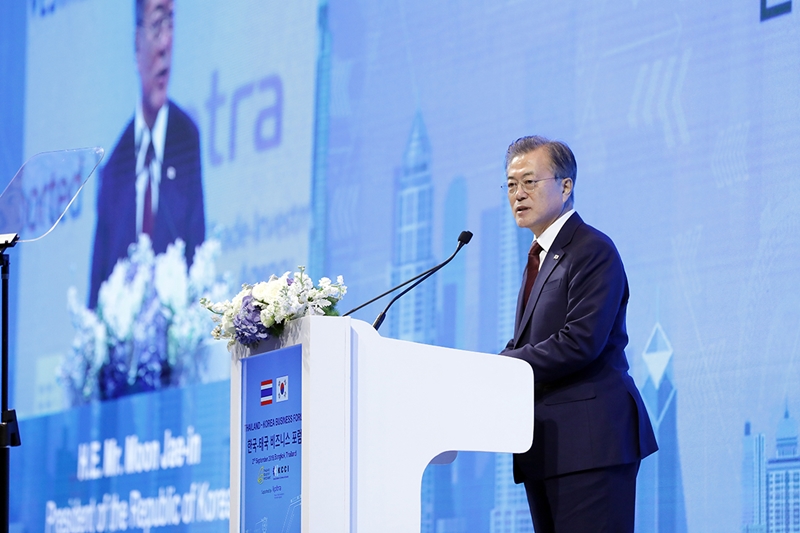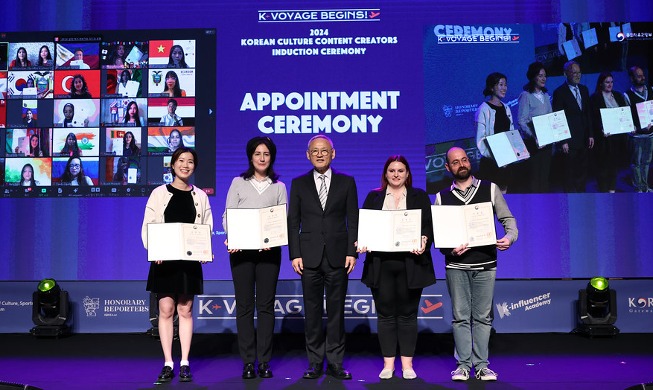-
 Korea.net's 24-hour YouTube channel
Korea.net's 24-hour YouTube channel- NEWS FOCUS
- ABOUT KOREA
- EVENTS
- RESOURCES
- GOVERNMENT
- ABOUT US
| With the inaugural Korea-Mekong Summit between Korea and the five countries along the Mekong River – Cambodia, Laos, Myanmar, Thailand and Vietnam – and the Korea-ASEAN (Association of Southeast Asian Nations) special summit coming up in November in Busan, Korea.net explores the results of President Moon Jae-in's visits to all 10 ASEAN member countries since his inauguration, Korea's exchanges with these nations and the potential for economic cooperation.. |

President Moon Jae-in (left) and Thai Prime Minister Prayuth Chan-o-cha (right) on Sept. 2 shake hands in Bangkok after their joint news conference.
By Park Hye Ri and Lee Jihae
Photos = Cheong Wa Dae
Thailand is the No. 2 economic powerhouse among member states of the Association of Southeast Asian Nations (ASEAN) thanks to an economic development policy that has fostered trade in the region and attracted foreign capital.
Korea and Thailand established diplomatic ties in 1958 and elevated their relationship in 2012 to a "strategic partnership." Both countries have strengthened bilateral cooperation in people-to-people exchanges and investment.
Last month, President Moon Jae-in became the first Korean leader to pay a state visit to Thailand in seven years. There, he discussed mutual prosperity, enhancement of goodwill between the people of the two countries, and cooperation between Korea and ASEAN member nations.

President Moon Jae-in on Sept. 2 holds a summit with Thai Prime Minister Prayuth Chan-o-cha.
Expanding exchanges and cooperation
Thailand, which has the second-highest rate of people-to-people exchanges among ASEAN member countries after Vietnam, is increasing such exchanges with Korea. Last year, an estimated 2.36 million people in Korea and Thailand participated in such exchanges.
In his state visit to Thailand from Sept. 1-3, President Moon said active people-to-people exchanges between the two countries have laid a strong cornerstone for bilateral ties. He also pledged to strengthen protection of the rights and interests of both countries. His trip also saw both sides ratifying the General Security of Military Information Agreement, a bilateral accord on sharing military intelligence that is expected to strengthen Korean-Thai cooperation in military affairs and the defense industry.

President Moon Jae-in on Sept. 2 gives a keynote address at the Korea-Thailand Business Forum in Bangkok.
Boosting cooperation in next-generation industries
President Moon emphasized bilateral cooperation in technology for the two countries to jointly respond to the Fourth Industrial Revolution. Since 2016, Thailand has carried out the economic model Thailand 4.0 to foster next-generation industries, while Korea is focusing on developing new sectors and boosting innovation.
The two countries ratified a memorandum of understanding on the Fourth Industrial Revolution, including details on their joint goal of developing new industries and sharing relevant information and personnel.
Under this agreement, both sides will form a director-general-level joint working group and lay a foothold for bilateral cooperation in future cars, robots and the bio sector. President Moon expressed his hope that two-way cooperation in innovation and technology will lead to a great synergy effect.
Thailand, the chair country of ASEAN this year, and Korea are set to further bolster their ties and cooperation through the Korea-ASEAN commemorative summit and the inaugural Korea-Mekong Summit next month in Busan.
hrhr@korea.kr









![[ASEAN now ②] Myanmar: Asia's 'last frontier market'](/upload/content/image/1569976211800.jpeg)
![[ASEAN now ①] Laos: ASEAN's fastest growing economy](/upload/content/image/1569372098660.jpeg)
![[ASEAN now ⑩] Indonesia: 1st result of New Southern Policy](/upload/content/image/617069a0d9574b06a4a83f43e99dfb40_20191120131736.jpg)
![[ASEAN now ⑨] Vietnam: Korea's No. 4 ASEAN trading partner](/upload/content/image/79f0eea689cf47ff9fdc25ac768616f6_20191117235136.jpg)
![[ASEAN now ⑧] Philippines: Korea's 1st ASEAN diplomatic partner](/upload/content/image/d46760685e364ed19cb0ea9eda088fdb_20191114105054.jpg)
![[ASEAN now ⑦] Singapore: Partner for 4th Industrial Revolution](/upload/content/image/6129cfbb76bd4e9795a92bdb3251ca9e_20191105100620.jpeg)
![[ASEAN now ⑥] Brunei: Asia's energy hub](/upload/content/image/c1d5d8bb16a9492dadd68fb6d5d1d74c_20191029132304.jpg)
![[ASEAN now ⑤] Malaysia: global hub of halal industry](/upload/content/image/f9c9ee3adcc242f19542538f3f0a8fa7_20191022133301.jpeg)
![[ASEAN now ④] Cambodia: Korea's No. 2 cooperation partner in ASEAN](/upload/content/image/c6f087d253584df897f284fda0d9d3ea_20191014110441.jpg)
![[ASEAN now ③] Thailand: ASEAN's economic powerhouse](/upload/content/image/1570517340524.jpeg)




